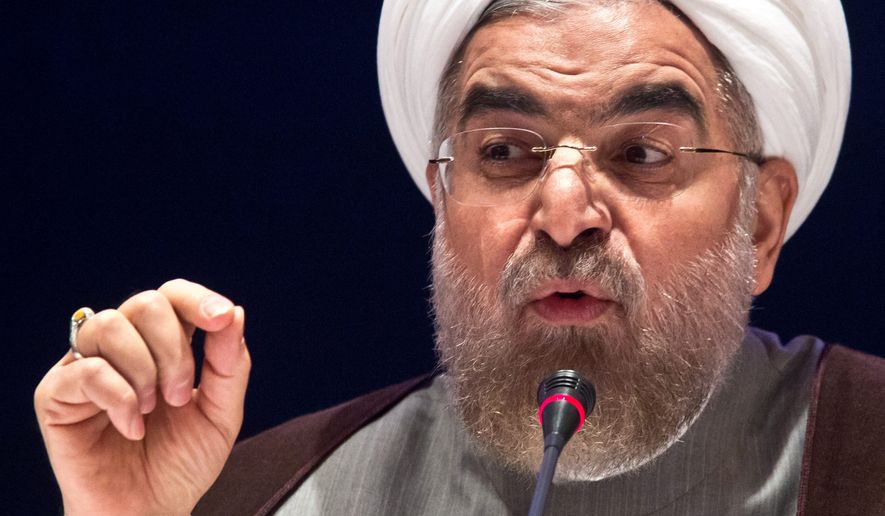As the infighting among the world’s oil producers heats up, the global price of oil is heading down.
Open sniping between leading members of OPEC put new downward pressure on oil prices, with the price of benchmark U.S. crude falling another 5 percent, or $3.07, to $60.75 a barrel in trading Wednesday. Oil prices, which topped $107 this summer, have now fallen more than 40 percent since June.
Analysts said the price fall, which is having profound ramifications throughout the global economy, reflects a variety of factors, from slumping demand in China and political instability in Libya to new sanctions on Russia and the U.S. production boom tied to the shale oil fracking revolution. But the inability of OPEC and other suppliers to pull together and ease a glutted market is becoming a growing factor in the market equation.
In a clear dig at global leader Saudi Arabia, Iranian President Hassan Rouhani Wednesday angrily denounced what he called a “conspiracy against the Muslim world” in the cartel’s failure to cut back production even as prices have plunged. With far lower production costs, Saudi Arabia and other Gulf producers can still turn a healthy profit even at today’s current depressed prices, while higher-priced producers such as Iran, Venezuela and Russia cannot.
Many in Iran, a Shiite-dominated regime, see the oil price fall as an extension of the battle for influence in the region with Saudi Arabia and its Sunni allies in the region.
“The fall in crude price is not merely an economic issue,” Mr. Rouhani told reporters in Tehran. “Iran and people of the region will not forget such conspiracies — or, in other words, treachery — against the interests of the Muslim world.”
SEE ALSO: PETER MORICI: Dumb policies frustrate benefits of falling oil prices
A top Iranian oil official on Tuesday warned an industry conference in Dubai that unless leading producers can find common ground, the world could be looking at prices as low as $40 a barrel in the coming months.
“Any break in OPEC solidarity or a price war will lead to an enormous price dive-shock” that would push prices to that level, Mohammad Sadegh Memarian, head of market analysis for Iran’s oil ministry, told an industry conference in Dubai Tuesday.
The price spiral has had a dramatic effect on both oil prices and oil company stocks, with sharp declines on Wednesday that helped pull down the overall Dow Jones index more than 200 points, while the broader S&P 500 suffered its biggest one-day loss in two months.
Saudi officials, who see the lower price as, in part, a way to undercut the growing challenge from U.S. shale oil producers, are brushing off the complaints from Tehran.
But Saudi Oil Minister Ali Al-Naimi, speaking with reporters while attending a summit on climate change in Peru Wednesday, said he saw no reason to scale back the kingdom’s output.
“Why should I cut production?” he asked, according to the Bloomberg news service. “You know what a market does for any commodity: It goes up and down and up and down.”
OPEC’s dominance of global oil markets has greatly declined since the 1970s and 1980s, but the open warfare between top producers in recent weeks may prove a lethal blow to its influence. Francisco Blanch, head of Bank of America Merrill Lynch’s commodities group, told a conference on the 2015 global oil outlook Tuesday that “OPEC has really, in my opinion, dissolved as a cartel.”
The oil glut has a bright side, for drivers at the gas pump and for nonenergy companies whose customers suddenly have more disposable income to spend.
The U.S. Department of Energy on Tuesday again slashed its forecast for gas prices in 2015, now estimating that prices at the pump will average $2.60 a gallon. That’s nearly 25 percent below the 2014 estimate and the lowest full-year average since 2009. Based on current consumption patterns, that adds up to a $100 billion rebate for American drivers.
And retailers and consumer goods companies are increasingly bullish that the lower gas prices could mean more spending on other goods.
Donnie Smith, CEO of the food service giant Tyson Foods, said the drop in both crude oil and gas prices has had a direct — and positive — impact on the company’s business and stock value.
“It’s very good for business,” he said in an interview on CNBC Wednesday. “It puts more disposable income in our consumers’ pockets, and that means more trips and more food service [business]. We’re very optimistic about how the current economy is going to affect our business.”
On Wednesday, big energy stocks such as ExxonMobil, ConocoPhillips and Chevron Corp. all were off sharply. BP announced it was taking a $1 billion restructuring charge and was cutting its planned spending on development by as much as $2 billion in 2015. Many exploration projects around the world that were profitable when a barrel of oil went for $100 have been put on indefinite hold as prices have tumbled.
But suppliers are still having trouble working down the supply glut to match current demand.
U.S. markets were rocked Wednesday by a new government report that found crude oil stockpiles held by refiners and traders rose by 1.5 percent for the week of Dec. 5 to 380.3 million barrels. The consensus forecast had been that stockpiles were going to decline for the week.
• David R. Sands can be reached at dsands@washingtontimes.com.




Please read our comment policy before commenting.